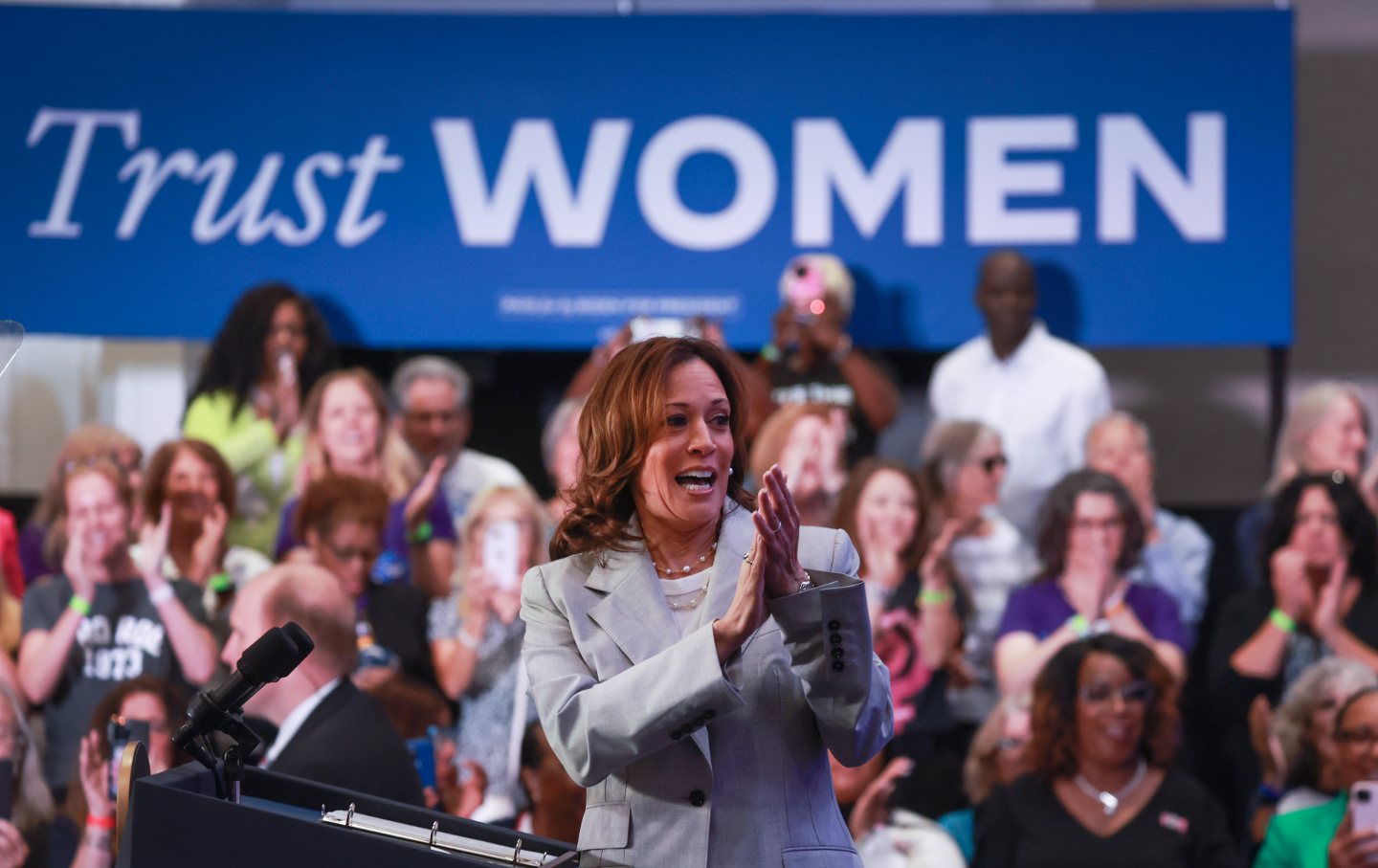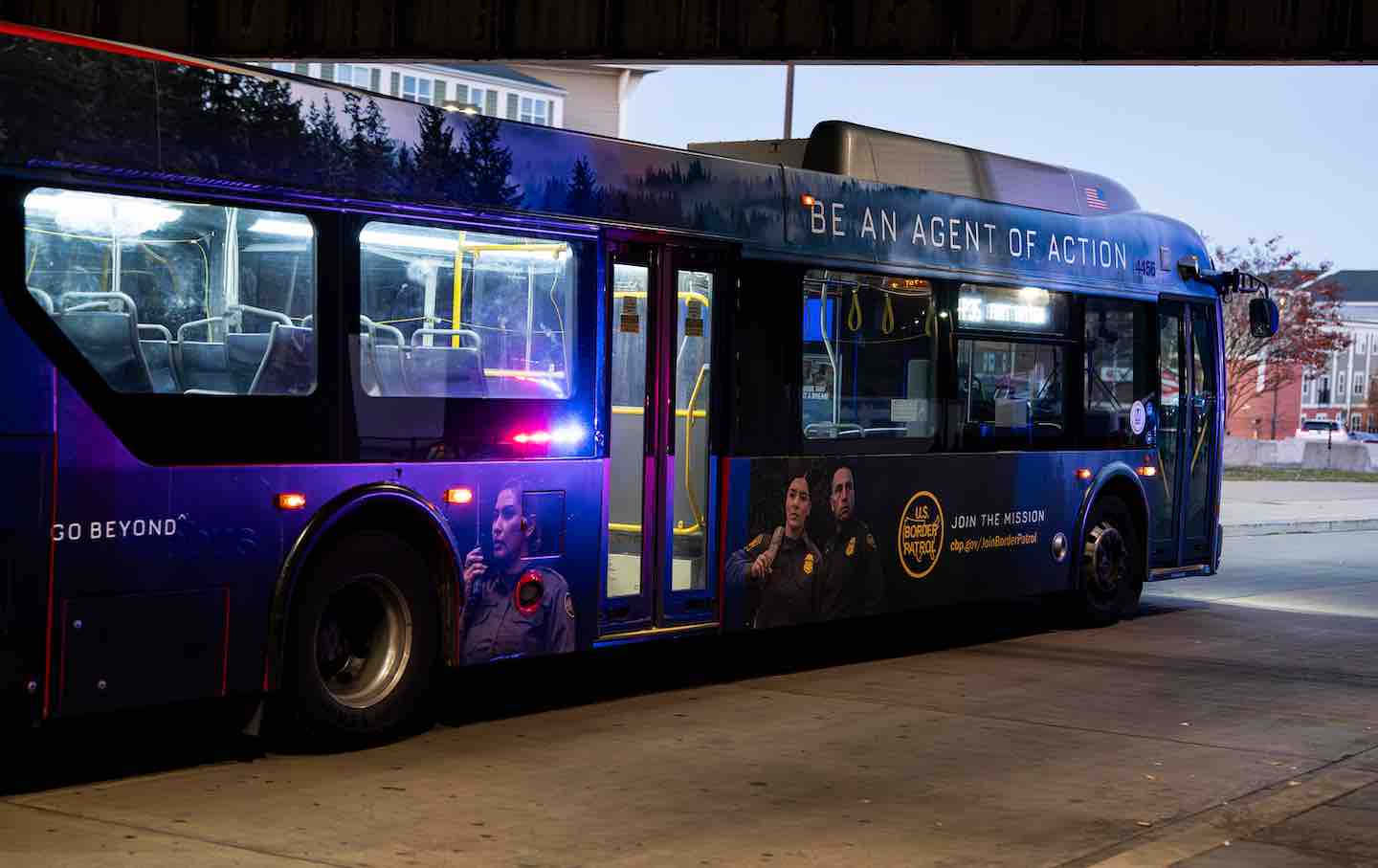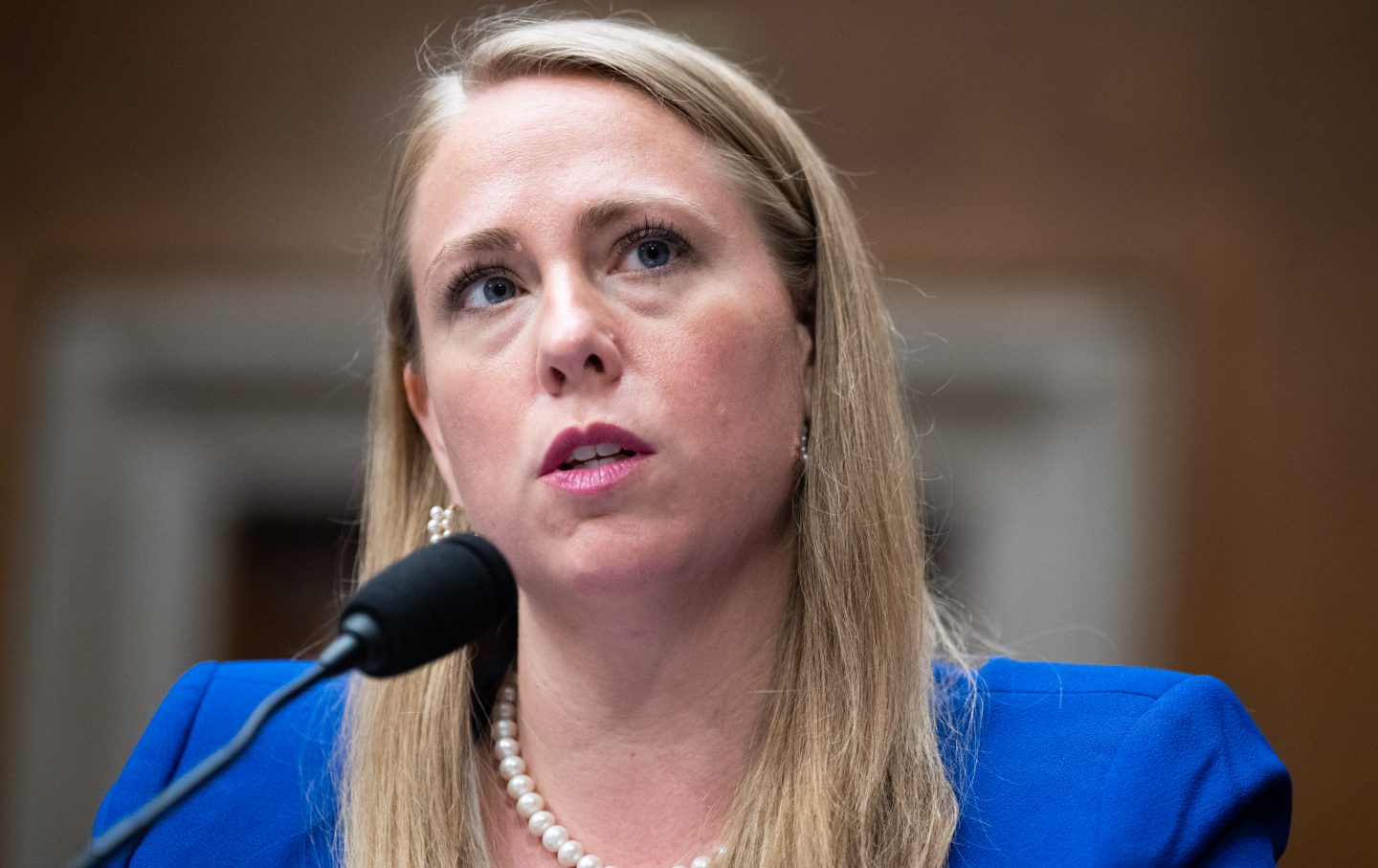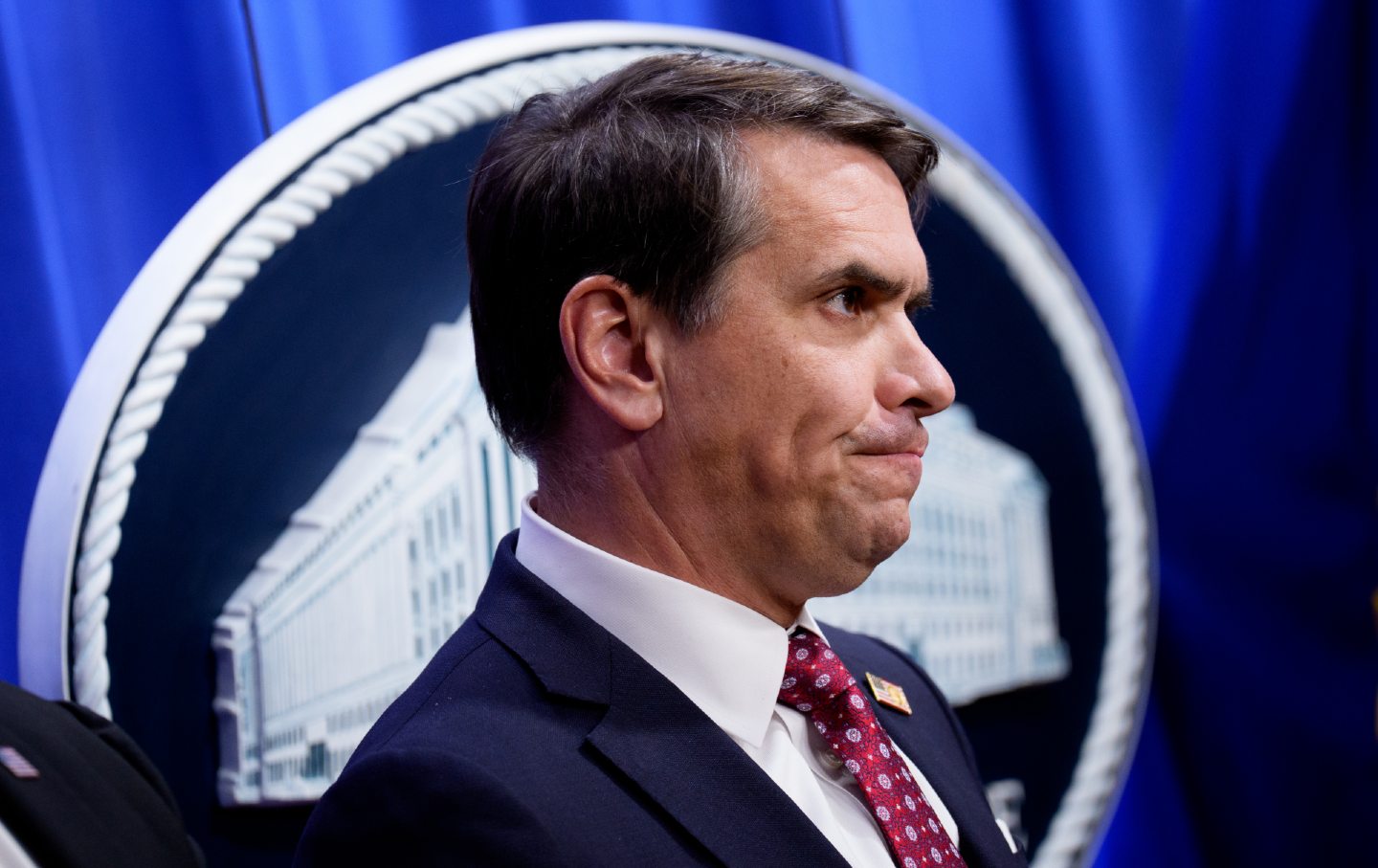Now Is the Time for Kamala Harris to Flip the Script and Win Big on Abortion
The Democrats have a chance to become the party that wants to grant you the freedom to terminate a pregnancy and the freedom to raise the children you want.

Vice President Kamala Harris in Jacksonville, Florida, decrying Florida’s new six-week abortion ban.
(Joe Raedle / Getty Images)Something unexpected happened to me while I was watching the Democratic National Convention on Monday night. I was sitting in my pajamas listening to Hillary Clinton’s speech when I started sobbing. Did Hillary Clinton just make me cry? I thought, horrified, afraid I might be having a sudden-onset midlife crisis. This was the woman I had protested in college over her support for the Iraq War. In 2016, I was a Bernie girl, and today, in 2024, I’m so outraged over Democrats’ support for the Israeli war on Gaza that I expected to watch the entire convention with my jaw clenched. But then Clinton invoked the legacy of Shirley Chishom. “In 1972, a fearless Black congresswoman named Shirley Chisholm, she ran for president, and her determination let me and millions of others dream bigger,” Clinton said. “Not just because of who she was, but because of who she fought for: working parents, poor children, the last, the least, and the lost.” Suddenly, I could see a portal between Chisholm’s “unbought and unbossed” feminism and this moment, and it dawned on me that the fall of Roe v. Wade had cracked that portal open.
Clinton continued: “I wish my mother and Kamala’s mother could see us. They would say, ‘Keep going.’ Shirley and Gerry [Ferraro] would say, ‘Keep going.’ Women fighting for reproductive healthcare are saying, ‘Keep going.’ Families building better lives, parents stretching to afford childcare, young people struggling to pay their rent—they’re all asking us to keep going.”
Was this it? I wondered, wiping tears onto my pajama top—was this the moment when the Democratic Party finally acknowledged low-income women of color as its foundation? Was the party finally going to talk about how economic and racial justice are intertwined with abortion rights? It was so refreshing to hear Clinton talk about reproductive healthcare and “parents stretching to afford childcare” in the same breath. So often, abortion has been siloed off as a “hot-button social issue,” even though that’s not how people experience it in real life. That framing has granted Republicans an escape hatch, allowing them to avoid the glaring contradiction at the heart of their agenda—that they force people, especially poor women of color, to continue pregnancies against their will, while pushing economic policies that make it harder to raise children. Democrats have a chance now to flip the script—to become the party that wants to grant you the freedom to terminate a pregnancy and the freedom to raise the children you want. They can do so by offering economic policies like universal health care, affordable childcare, paid family leave, access to safe housing and nutritious food—and by tying these economic policies back to the issue of reproductive freedom. Most people make decisions about their pregnancies based at least in part on their financial circumstances, which means abortion is inextricable from economic policies like these. What if Kamala Harris wove all these tendrils together, creating a Reproductive Justice New Deal for 2024?
For decades, Republicans have used abortion as a wedge—a way to divide Democratic voters and funnel Catholics and evangelicals into their party. Now, with abortion at the center of the Democratic National Convention thanks to the fall of Roe, I caught a glimpse of a future where Democrats use abortion as a different kind of wedge—one that cracks open the door to a more progressive agenda not just on “social issues” but on economic issues too. Clinton sounded so close. And her words affected me more because they were coming not from Representative Alexandria Ocasio-Cortez, who gave her own barnburner of a speech earlier in the night, but from someone who, at least earlier in her career, had represented the worst conciliations of the Democratic Party on abortion and welfare. Today, thanks in part to the reforms of the Bill Clinton era, welfare is in tatters. Most parents are struggling to afford childcare, and we lack the right to paid parental leave that is a given in almost every other country. Decisions about unplanned pregnancies are inextricable from these policy failures. Yet Democrats almost always talk about abortion as separate from bread-and-butter economic issues—as a matter of privacy, like an embarrassing family secret.
More DNC Coverage
This year, after abortion won seven ballot referenda in a row, Democrats have finally caught on to the fact that abortion is a winning issue—but if they continue to talk about it in isolation from the rest of working people’s lives, they will miss the opportunity to energize their base with a message that meets this moment. After all, progressive economic policies like affordable childcare and Medicare for All are popular, just like abortion, as a recent poll commissioned by the campaign of Senator Bernie Sanders shows. As Ocasio-Cortez put it in a social-media post: “Abortion rights are a class struggle too. When the powerful force people to give birth against their will, they trap millions into cycles of economic setback and desperation. Especially in a country without guaranteed healthcare.”
What if Kamala Harris embraced a message like this one on Thursday, tying a promise of universal healthcare, child tax credits, and affordable daycare to reproductive freedom? She could use a framework that already exists—the one outlined by Black women who gathered on the sidelines of a conference in 1994 after the Clinton administration announced that it would exclude reproductive health care from its health care reform plan. Outraged, the women set out a framework that defined reproductive justice as “the human right to maintain personal bodily autonomy, have children, not have children, and parent the children we have in safe and sustainable communities.”
This is the kind of bold, winning framework that could energize the Democratic base. But for Harris to embrace it would be major departure from DNC history—to say the least.
In 1992, Bill Clinton strode onto the stage at the Democratic National Convention, just a few weeks after the Supreme Court had opened the flood gates to steep abortion restrictions with its decision in Planned Parenthood v. Casey. “Listen. Here me now,” Clinton declared. “I am not pro-abortion; I am pro-choice, strongly. I believe this difficult and painful decision should be left to the women of America. I hope the right to privacy can be protected and we will never again have to discuss this issue on political platforms.” He went on, “I am old enough to remember what it was like before Roe v. Wade, and I do not want to return to the time when we made criminals of women and their doctors.” As we all now know, this way of treating abortion as a private issue and stigmatizing those who have them has failed to prevent the very criminalization he feared. It has also obscured the wider economic context in which this decision is often made—one that depends, in large part, not just on private thoughts but on public policy.
By 1996, Clinton had settled on the language that would define the Democratic position in the 1990s, declaring at the convention that year that “abortion should not only be safe and legal, it should be rare.” His comments were even more galling because exactly one week earlier, Clinton had signed legislation to “end welfare as we know it,” converting direct payments to families into block grants for states and thereby ensuring that more working-class people were going to struggle to afford the families they had or wanted.
Two decades later, when Hillary Clinton accepted the Democratic nomination, she was cursory in her mention of abortion: “If you believe we should expand Social Security and protect a woman’s right to make her own health care decisions…join us,” she declared, adding a mention of “women’s rights” later in the speech. She wasn’t alone in glossing over the issue. In 2020, neither Biden nor Harris mentioned abortion in their remarks at the DNC—although Harris made a reference to “injustice in reproductive and maternal health care.” At the Republican National Convention, Trump, on the other hand, launched into a fantastical monologue on “extreme late-term abortion” and how Democrats “have no problem with stopping a baby’s beating heart in the ninth month of pregnancy.” It was clear which party was prioritizing the issue that year—and Republicans’ single-minded pursuit of overturning Roe v. Wade paid off two years later.
But oh, how the tables have turned.
This year, as polls show abortion is more popular than any top-of-the-ticket candidate, it’s Republicans who are running scared from the issue. Trump, who has often liked to brag about overturning Roe, didn’t mention abortion once at the Republican National Convention in July. Nor did JD “Childless Cat Ladies” Vance, a man who once declared that abortion was the first political issue he ever cared about, and who has mused about how a nationwide abortion ban could be used to stop patients from traveling out of state.
But at the Democratic National Convention, reproductive rights are having their moment. On the opening night Monday, two women who became severely ill after being denied treatment for doomed pregnancies and a third who became pregnant from rape when she was 12 told their stories one after the other under spotlights on the stage. These heartbreaking accounts of almost-dead women and child rape victims are enraging and effective, and the crowd was appropriately aghast at their stories. But they do not tell the whole story. They leave out the more mundane horrors of our moment, like how most people are living paycheck to paycheck, so what happens when they face an unintended pregnancy in a state where abortion is banned? We must hear these stories too, as well as the stories of people who just don’t want to have a kid right now. Harris can acknowledge these realities by channeling Chisholm, who was far ahead of her time in 1969 when she declared: “The majority of women who seek abortions do so not because they have been raped, exposed to German measles or have serious heart or liver ailments…They seek abortions because they find themselves with unwelcome or unwanted pregnancies.”
There’s no shame in admitting this plain fact—indeed, there may be victory in it.
It was fitting that Hillary Clinton and President Joe Biden spoke on the opening night of the convention, a sign they are passing the torch to a younger generation of politicians who are more comfortable and credible on abortion rights, who understand the issue not only as one of privacy but of self-determination too. Already, Harris has proven to be far more compelling on the issue than Biden, who was 468 days into his presidency when he finally said the word “abortion” for the first time, according to the website didbidensayabortionyet.org. Biden did utter “abortion” during his speech at the convention Monday when he said Trump would institute a nationwide abortion ban; then he called on voters to “elect a Senate and a House to restore Roe v. Wade.” Other speakers talked about the need for access to contraception and the right not to have children at all. A new and encouraging phase in the Democratic Party’s relationship with reproductive rights is emerging. The next step is to point out that reproductive freedom includes economic freedom—healthcare, safe housing, access to nutritious food, and robust investment in public schools—and, of course, to avoid falling back into the same stigmatizing, tired old rhetoric.
Popular
“swipe left below to view more authors”Swipe →Whatever Kamala Harris says about abortion Thursday, I hope it does not end with “restore Roe.” Tens of thousands of abortion seekers were denied care every year due to abortion restrictions while Roe was in place, as a coalition of reproductive health and justice groups who signed the Abortion Justice Now memo point out. Roe allowed states to ban abortion after “viability,” which is around 24 weeks. “Gestational and viability limits will disproportionately impact the most marginalized among us, either denying them critical care or pulling families toward financial instability,” the authors wrote. “These limits will result in an inequitable ability to exercise rights, allow for criminalization in pregnancy, and ultimately reinforce the dangerous assertion that the government has any role in regulating a pregnant person’s body.” Many ballot initiatives this year from Florida to Arizona would enshrine the Roe limit into state Constitutions, but at least one poll shows that core voters might be more supportive of these measures without such limits.
This might all sound like dreaming, but now feels like the moment to dream. The compromising, apologetic approach to abortion rights has brought us to this moment of profound loss. Yes, the Democratic Party’s official platform calls for “national legislation to make Roe the law of the land again.” But it also calls for repealing the Hyde Amendment, the ban on federal funding of abortion that Biden supported when he was in the Senate in the 1970s, and continued to support until 2019, when organizing led by feminists of color forced him to change a position he had held for four decades. As Rebecca Traister pointed out, now is the moment for exhilarating risk and for understanding that avoiding risk and uncertainty is part of what landed us here to begin with. Now is the moment when fears that a Black woman could never win the presidency have given way to the dawning realization that a Black woman is doing better than the white male incumbent in key swing states. Part of the reason I found myself weeping on Monday is the sheer thrill of knowing we might be about to elect a Black woman president, however imperfect she may be. When we all sit down to watch Kamala Harris make history on Thursday, I hope we’ll hear in her words the voice of Shirley Chisholm, yes, and the voices of the mothers of reproductive justice, who, on a discouraging day in the midst of Bill Clinton’s administration sat down and declared what should be obvious: that everyone deserves the right to “have children, not have children, and parent the children we have in safe and sustainable communities.”
More from The Nation

Why Is Washington DC Blanketed in Ads for the Defense Industry? Why Is Washington DC Blanketed in Ads for the Defense Industry?
In the metro and in public spaces, its hard to miss all the advertisements hawking the lethal wares of military contractors, tech companies, and the like.

The EEOC Is on the Verge of Making It Harder for Workers to Fight Harassment The EEOC Is on the Verge of Making It Harder for Workers to Fight Harassment
The agency is planning to delete a document that provides up-to-date guidance on the protections workers have in this complex and rapidly changing area of law.

One Year Into Trump 2.0, Elon Musk Is Still Poised to Be Kingmaker One Year Into Trump 2.0, Elon Musk Is Still Poised to Be Kingmaker
The neofascist tech oligarch was cast out of Trump’s inner circle, but his money and influence are still omnipresent.

A Trump Administration Official Says It Won’t Investigate the Killing of Renee Good A Trump Administration Official Says It Won’t Investigate the Killing of Renee Good
Deputy Attorney General Todd Blanche makes clear that the Department of Justice won’t look into the death of Renee Good—but that won’t stop Minnesota from investigating.

Martin Luther King Jr.’s Dream: Love Against Racism Martin Luther King Jr.’s Dream: Love Against Racism
As Dr. King reminded us, “Hate cannot drive out hate; only love can do that.” His words continue to call us toward justice, compassion, and the power of love to confront racism.



